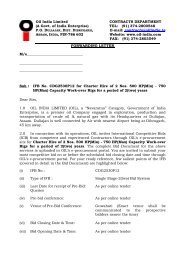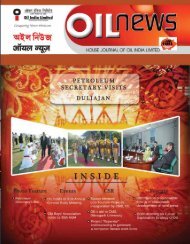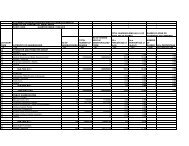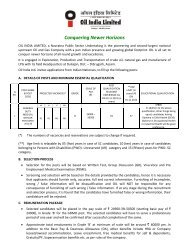July-Dec, 2012 (Special Issue) - Oil India Limited
July-Dec, 2012 (Special Issue) - Oil India Limited
July-Dec, 2012 (Special Issue) - Oil India Limited
Create successful ePaper yourself
Turn your PDF publications into a flip-book with our unique Google optimized e-Paper software.
2.0 What is project Management?<br />
By definition “Project management is the application of<br />
knowledge, skills, tools, and techniques to project activities<br />
to meet project requirements. Project management is<br />
accomplished through the use of the processes such as:<br />
initiating, planning, executing, controlling, and closing”. –<br />
Project Management Book of Knowledge (PMBOK)® Guide<br />
PMI published<br />
In essence, project management is taking responsibility<br />
for the successful completion of the job. It is a discipline<br />
of planning, organizing and managing resources to bring<br />
about the successful completion of specific project goals<br />
and objectives.<br />
The PMBOK Guide, groups 42 project management<br />
processes into following five process groups.<br />
1. Initiating: Defining and authorizing the project<br />
2. Planning: Establishing the project scope, refining the<br />
objectives, and defining the course of action to attain<br />
the objectives<br />
3. Executing: Integrating people and other resources to<br />
carry out the work defined in the project plan<br />
4. Monitoring and Controlling: Tracking, reviewing, and<br />
regulating the progress and performance of the project<br />
plan, identifying where changes to the plan are required,<br />
and taking corrective action<br />
5. Closing: Finalizing all activities across all the process<br />
groups to formally close the project<br />
Now the question is “Is it necessary to have for a formal<br />
education on project management before a manager takes<br />
up a project? The answer is surely “No”. In fact, some<br />
of the most effective and successful project managers<br />
around the globe never had any formal education on<br />
project management but they surely had the knowledge<br />
on the project management techniques to deal with the<br />
projects they handled. It is no doubt advantageous for a<br />
project manager if he or she possess a formal education<br />
or degree on Project management but at the same time<br />
project managers without the formal education on project<br />
management can also successfully complete projects by<br />
acquiring project management skill which can be learned<br />
or developed by self study, reading, training and most<br />
important the practice.<br />
3.0 What is a project?<br />
By project we mean “A temporary endeavor undertaken<br />
to create a unique product or service”. - PMBOK® Guide<br />
PMI<br />
Temporary means that every project has a definite<br />
beginning and a definite end and Unique means that the<br />
product or service is different in some distinguishing way<br />
from all other products or services. The project goal is to<br />
get the job done on time, within budget and according<br />
to specifications. This is the triple constraint or the iron<br />
triangle i.e. time, cost and the scope. Here If any one of the<br />
side of the triangle changes, the other two should change<br />
too. Otherwise quality will be adversely affected.<br />
In this context it would be worth knowing the definition<br />
of some of the important terminologies used in project<br />
management<br />
Portfolio: It is a collection of projects that are grouped<br />
together to facilitate effective management. The projects<br />
may not necessarily be directly related<br />
Programs. A program is a group of related projects managed<br />
in a coordinated way to obtain benefits not available from<br />
managing them individually. Many programs also include<br />
elements of ongoing operations. Project management is a<br />
subset of program management<br />
Operations and projects differ primarily in that operations<br />
are ongoing and repetitive while projects are temporary<br />
and unique.<br />
Project Management Office (PMO): An organized body<br />
or entity which organizes and administers control over all<br />
projects within an organization. It may either provide project<br />
management support or may actually be responsible for a<br />
project.<br />
Work Breakdown Structure (WBS): It is a graphical tool<br />
which organizes all the project work by placing elements of<br />
work into a logical and hierarchical grouping. The elements<br />
of work can be further divided till the level of details<br />
required is achieved. A WBS is a deliverable-oriented<br />
grouping of project components that organizes and defines<br />
the total scope of the project; work not in the WBS is<br />
outside the scope of the project. It also serves as a tool to<br />
show breakdown of cost of a project. In the SAP ERP system<br />
the WBS is also used as cost collecting centre.<br />
Activity: Activity definition involves identifying and<br />
documenting the specific activities that must be performed<br />
to produce the deliverables and sub deliverables identified<br />
in the Work Breakdown Structure (WBS). Activities have<br />
duration, they have a defined start and a defined finish and<br />
they incur costs<br />
Activity sequencing involves identifying and documenting<br />
interactivity logical relationships. Activities must be<br />
sequenced accurately to support later development<br />
of a realistic and achievable schedule. Sequencing can<br />
be performed with the aid of a computer (e.g., by using<br />
project management software) or with manual techniques.<br />
Manual techniques are often more effective on smaller<br />
projects and in the early phases of larger ones when little<br />
detail is available. Manual and automated techniques may<br />
also be used in combination<br />
20
















